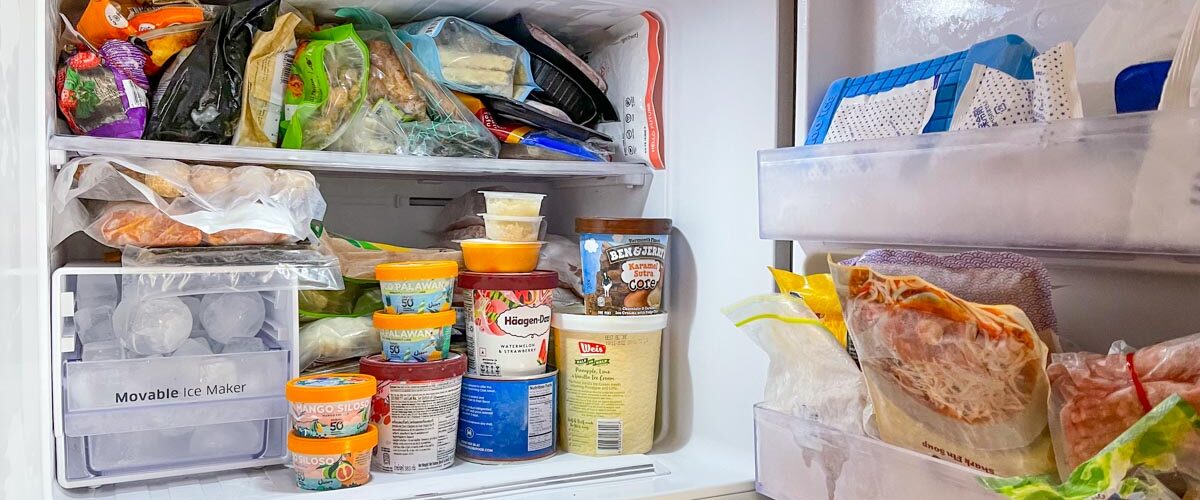A good freezer is one of the best investments you can make when outfitting your kitchen, as it can save you tons of time, money, and energy in the long run. Freezing premade food for meals or snacks can save you hours of cooking time and is much less costly than ordering out frequently. Buying food in bulk when it’s on sale or in season and freezing it will not only help you save money but also lets you enjoy fresh produce any day of the year.
The best part is that you can freeze all sorts of foods to keep them fresh longer without compromising their flavour or texture. Then, when you’re ready to enjoy them, all you’ll have to do is defrost them in your fridge or with a microwave oven until they’ve thawed. If you’re on the hunt for more ways to make everyday food prep more efficient, you’ll want to peruse our list of surprisingly freezer-friendly foods:
Grapes
Frozen grapes make the perfect refreshing snack for hot days, and they’re super-healthy to boot. Both red and white grapes freeze well, so choose whichever variant you like best and freeze them in a Ziploc bag for at least 8 hours before consuming. If you want your grapes extra-sweet, you can also try coating them in sugar before you freeze them.
Bananas
Bananas will darken and take on a mushy texture when frozen, but they taste as good as ever. They’re great for baking and blending into smoothies. You can freeze bananas peeled and cut into whatever shape you like, or you can mash them and freeze them in Ziploc bags or plastic containers. The latter option is especially useful if you intend to use your bananas for baking and need to measure out a specific amount. In these cases, it will help you to label your bags or containers with the measurement to avoid confusion.
Onions
So many recipes call for onions that it makes sense to just slice or dice up a lot of them at a time and freeze them for later use. All you need to do is cut them up and store them in a Ziploc bag. If you want to minimize clumping and make it easier to portion out smaller amounts of onion for your recipes, you can also flash-freeze them. Flash-freezing involves spreading out your cut onions on a baking sheet, freezing them that way, and transferring them to a bag afterward.
Do note that onions’ flavour and odour may spread to the other foods you store in your freezer. To prevent this, try double-bagging your onions before freezing.
Garlic
Garlic is another frequently used kitchen staple, but sometimes people buy so much garlic that it sprouts or goes bad before they can use it. Luckily, you can freeze garlic to preserve its fresh flavor and make your meal prep infinitely easier.
You can freeze garlic in a few different ways. While you can freeze an entire unpeeled head of garlic, for instance, separating it into individual cloves before freezing helps conserve space. If you want to save yourself more prep time later, you can peel and chop the cloves before storing them in a freezer-safe container or Ziploc bag. You can also blend garlic into a puree before freezing.
Butter
Butter, unlike other dairy products, retains the same texture and consistency even after it’s been frozen. You can freeze butter in full blocks or cut it into smaller pieces. To keep your butter tasting fresh and prevent it from absorbing other flavors, it’s best to freeze your butter in an air-tight container. You can also wrap it in tinfoil or plastic before placing it in the freezer.
Bread
Bread is a common staple in most households but it can get stale or grow molds if not consumed within a few days of baking. If you want to have bread available at all times, store it in the freezer. This is especially handy if you like to buy bread in bulk when it’s on sale, or if you want to preserve a loaf that’s on its way to going stale. Slice loaves before freezing so you don’t have to thaw out the entire loaf whenever you intend to use it.
Rice
Got some rice leftover from your last big batch? You can freeze what’s left, particularly if you buy long-cooking rice varieties like wild rice or brown rice, which freeze especially well. Frozen rice is generally better for cooking than for eating on its own, so it will work great in soups, porridges, and similar dishes. If you’d like to eat the rice as a side dish, try adding some water to the rice as you reheat it to prevent it from drying out.
Freezing your food will save you plenty of money in groceries, and it will also cut the amount of time and effort you spend on food prep every day. The abovementioned foods are just a few items that freeze well, so don’t hesitate to do more research and make your freezer work for you.




